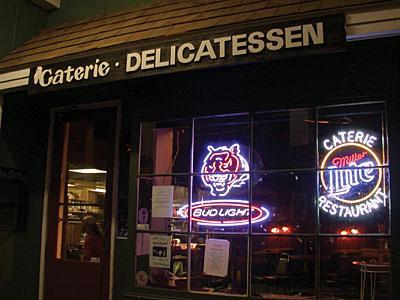A music licensing firm has accused The Caterie of profiting from live and recorded performances of 15 songs — including Aerosmith’s “Sweet Emotion,” The B-52’s “Love Shack” and Queen’s “Another One Bites the Dust” — without permission.
On April 23, Broadcast Music Inc. — better known as BMI — filed a lawsuit in U.S. District Court in Baton Rouge against The Caterie, alleging copyright infringement.
The Caterie’s owner, Darrin Dominguez, denies the claims and has been in negotiations with BMI’s lawyers to settle the matter out of court.
If a court were to rule copyright laws had been broken, the Caterie could be fined up to $1.8 million.
BMI is a performing rights organization that represents 300,000 songwriters and music publishers. According to a press release, the company’s primary role is to provide business copyright clearance to an inventory of about 4.5 million songs, while compensating songwriters and defending their legal rights.
Jerry Bailey, BMI’s director of media relations, said the matter was still in negotiations and most of these types of disputes are settled before entering a courtroom.
The U.S. Copyright Act of 1976 provides songwriters the sole right of public performance for their songs. Whether recorded or live, a business must obtain prior permission from the songwriter or the licensing organization before playing the songs.
“Under copyright law, no one can play or sing [other artists’] songs without their permission,” Bailey said.
Licensing fees depend on the amount of music performed and the establishment’s size, but according to BMI, a typical restaurant pays about $600. In comparison, according to The Advocate, a small coffee shop would pay the minimum fee of $265, while a large dance club with a cover charge could pay the maximum fee of $8,000.
BMI said The Caterie had a license from BMI until three years ago, when the business changed management, according to The Advocate. BMI said it cautioned Dominguez of the supposed infringements in 18 letters, 46 phone calls and one visit from a licensing executive.
Dominguez said on May 2 the lawsuit was settled, claiming a misunderstanding between both parties. Dominguez also said the settlement would not be official until May 6. Bailey said, upon contacting lawyers handling the case for BMI, the issue had not been settled and was still in negotiations.
Dominguez and Caterie manager Kevin Carmack, also named in the suit, could not be contacted for comment, but Dominguez told The Advocate he pays his fees and had no idea it was an issue.
The lawsuit lists Michael Jackson, Daryl Hall, John Oates and other songwriters as plaintiffs and alleges 15 instances of copyright infringement from Aug. 23 through 25.
Other tunes in contention are Michael Jackson’s “Beat It,” Rick Springfield’s “Jessie’s Girl,” Inc Lipp’s “Funkytown,” David Bowie’s “Fame,” Samantha Fox’s “Naughty Girls Need Love Too” and Cheap Trick’s “I Want You to Want Me.”
According to The Advocate, BMI is seeking statutory damages between $750 and $30,000 per song and if the infringement is proven to have been willful, up to $150,000.
Bailey said music played illegally in establishments extends to cover bands, but for the most part BMI holds the venue in fault.
“Technically, everyone responsible for infringement can be held responsible,” Bailey said. “The venue would be sued, not the musician or band. BMI does not usually pursue the musicians because the venue hired and paid the band — they are responsible, not the musicians.”
Bailey told The Advocate BMI files up to 200 infringement suits a year in federal courts, but these suits are always a last resort for BMI.
“We want people to use BMI music, but we want them to follow the law,” Bailey said. “We’re not out to shut down businesses. I mean, that would be defeatists to our business.”
Caterie accused of copyright law infringement
May 8, 2003

Caterie accused of copyright law infringement



